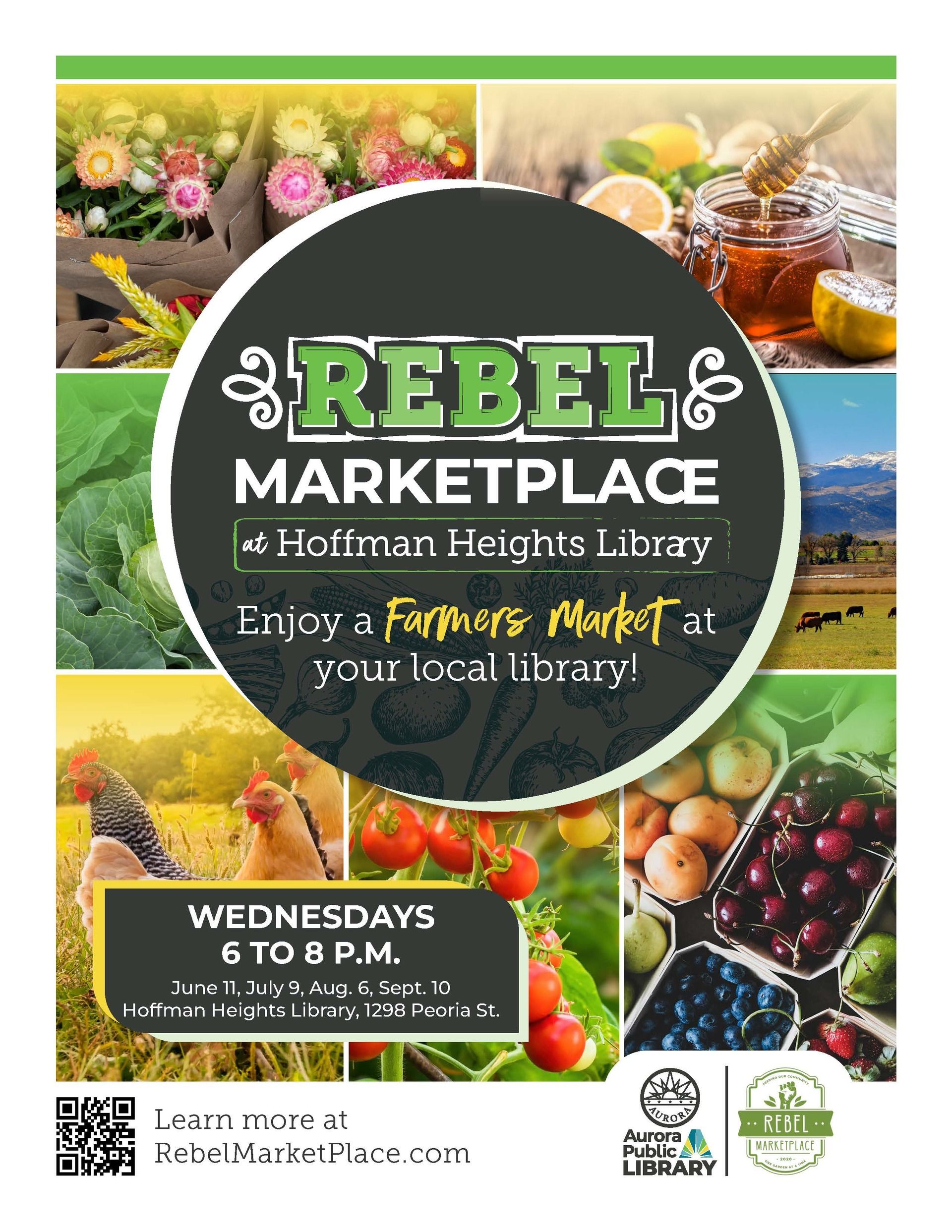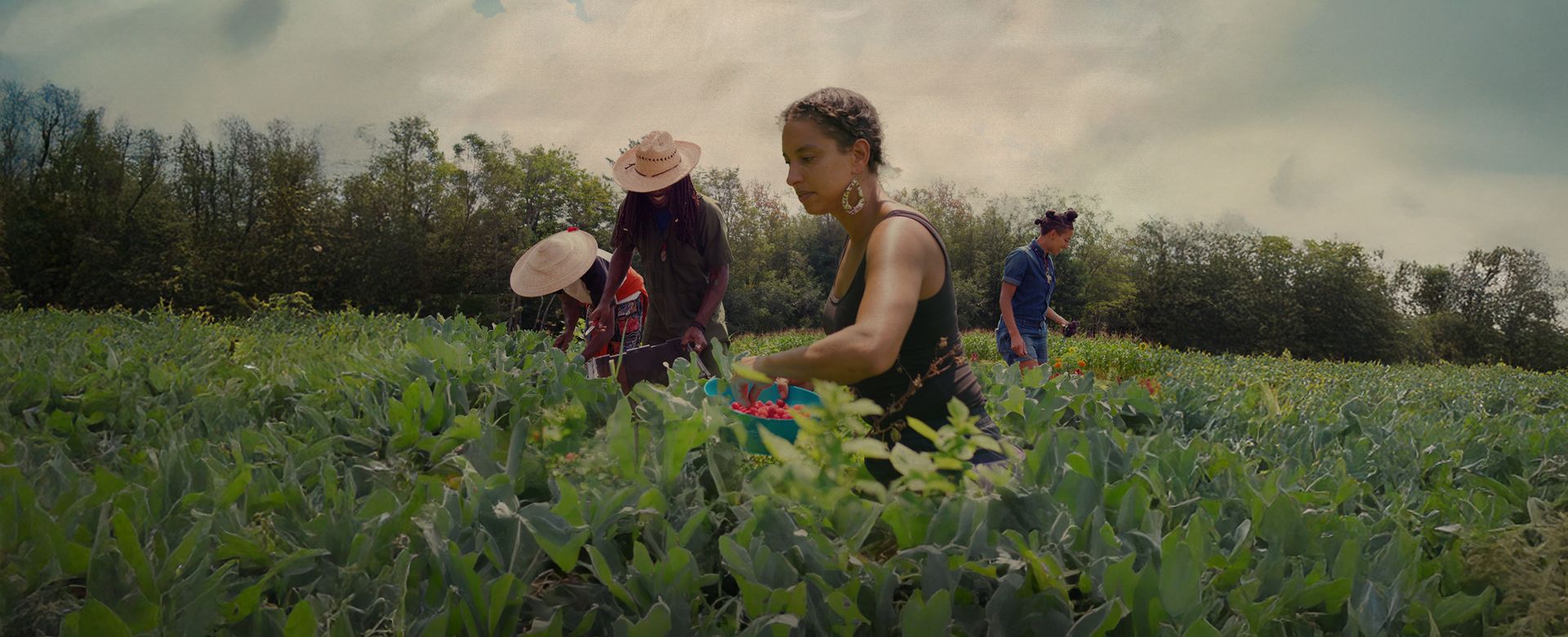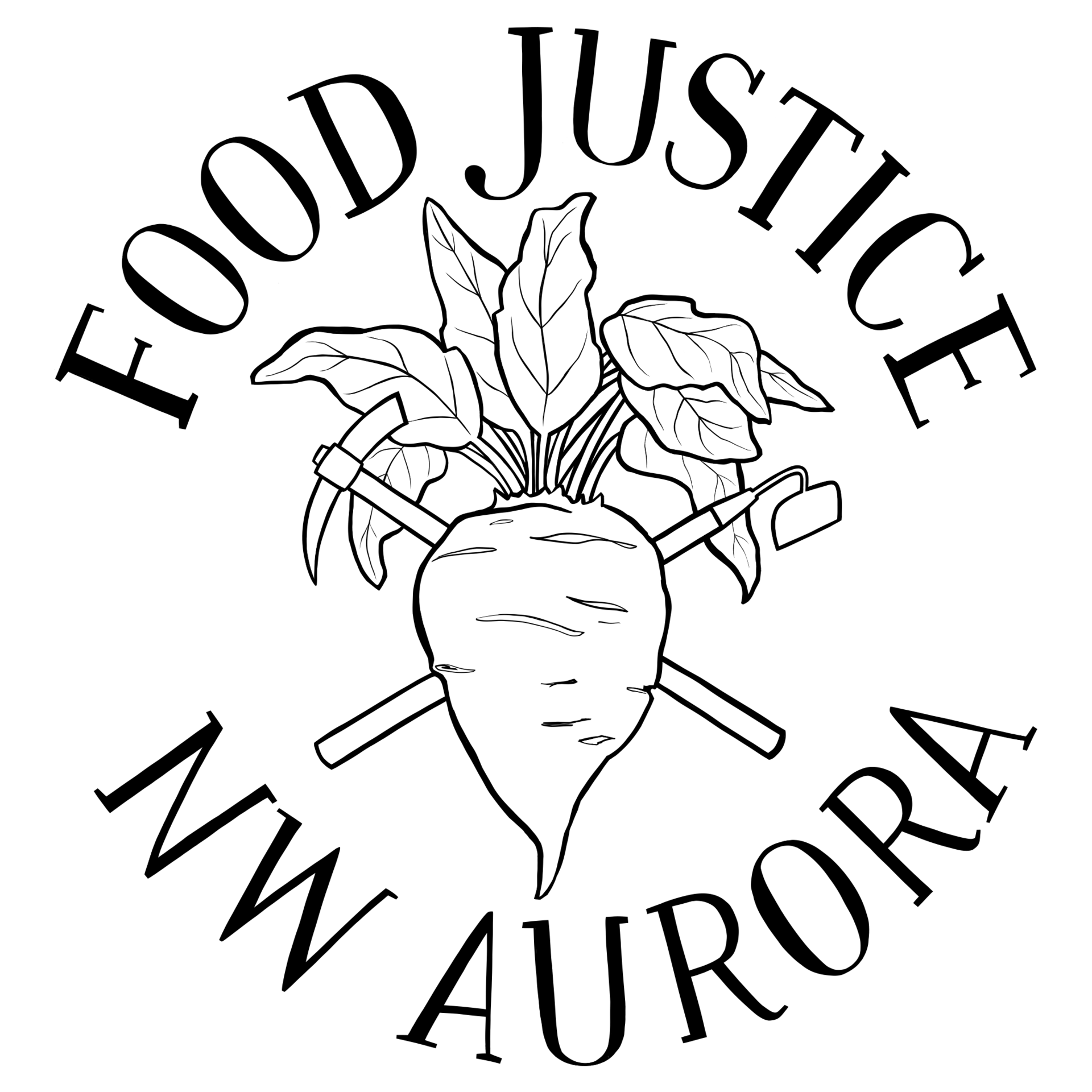June Newsletter 2025
Boletín de junio de 2025
UN BOLETIN DE SUS AMIGOS DE FOOD JUSTICE NW AURORA

Welcome! ¡Bienvenidos!
Welcome to our June newsletter! We are so excited to welcome the summer and spend time outdoors in the community!
¡Bienvenidos a nuestro boletín de junio! ¡Estamos muy emocionados de dar la bienvenida al verano y pasar tiempo al aire libre en la comunidad!
2025 Food Justice Festival Announcement
Anuncio del Festival de Justicia Alimentaria de 2025

We are excited to announce that we will be hosting our 4th annual Food Justice Festival on Saturday, September 27th at ABC Community Hub at Paris Elementary (1635 Paris St. Aurora, CO 80010)!
The Food Justice Festival is a multicultural celebration that promotes solidarity and collaboration among the growers, food businesses, community-based organizations, and residents of NW Aurora. It is an opportunity to have fun and enjoy ourselves, make new connections, share and hear ideas, and get involved in the food justice movement in our community.
Look out for more information as we get closer to the event date!
¡Nos complace anunciar que celebraremos nuestro cuarto Festival Anual de Justicia Alimentaria el sábado 27 de septiembre en ABC Community Hub en la Escuela Primaria Paris (1635 Paris St., Aurora, CO 80010)!
El Festival de Justicia Alimentaria es una celebración multicultural que promueve la solidaridad y la colaboración entre agricultores, empresas alimentarias, organizaciones comunitarias y residentes del noroeste de Aurora. Es una oportunidad para divertirse, crear nuevas conexiones, compartir ideas y participar en el movimiento por la justicia alimentaria en nuestra comunidad.
¡Reserve la fecha y esté atento a más información a medida que nos acerquemos a la fecha del evento!
Promote Your Organization at the Festival
Promocione su organización en el Festival de Justicia Alimentaria

Applications are now open for organizations to attend and promote themselves at the Food Justice Festival! It is an opportunity to have fun and enjoy ourselves, make new connections, share and hear ideas, and get involved in the food justice movement in our community. Groups participating can distribute information and resources, promote upcoming events, offer activities or educational materials for kids and youth! There is NO COST for your organization’s participation.
If you and your organization are interested in tabling at the event, please complete our tabling request form by Friday, July 11th. We encourage you to fill out the form as soon as possible for our team to review. Due to space limitations, we will only be able to accept a limited number of organizations to participate. If we are unable to accommodate your organization, we will place you on a waitlist. Our team will review completed applications and send out communication by Friday, August 1st.
Due to increased interest in this event, we will be prioritizing organizations that most closely align with the goals of the festival and the mission of FJNWA.
Please note, there will be a separate application for small businesses and vendors to apply to participate in the event. Information will be forthcoming.
¡Ya está abierta la solicitud para que las organizaciones sin fines de lucro y comunitarias asistan y se promocionen en el Festival de Justicia Alimentaria! Es una oportunidad para divertirse, forjar nuevas conexiones, compartir ideas y participar en el movimiento de justicia alimentaria en nuestra comunidad. Los grupos participantes pueden distribuir información y recursos, promocionar próximos eventos y ofrecer actividades o materiales educativos para niños y jóvenes. La participación es GRATUITA para las organizaciones comunitarias y sin fines de lucro.
Si usted y su organización están interesados en participar en el evento, complete nuestro formulario de solicitud antes del viernes 11 de julio. Les recomendamos que lo completen lo antes posible para que nuestro equipo lo revise. Debido a las limitaciones de espacio, solo podremos aceptar un número limitado de organizaciones. Si no podemos incluir a su organización, la incluiremos en una lista de espera. Nuestro equipo revisará las solicitudes completadas y enviará una comunicación antes del viernes 1 de agosto.
Debido al creciente interés en este evento, priorizaremos a las organizaciones que mejor se alineen con los objetivos del festival y la misión de FJNWA.
Tenga en cuenta que habrá una solicitud aparte para que las pequeñas empresas y los proveedores soliciten participar en el evento. Próximamente se les enviará información.
Submit Your Application Today!
¡Envíe su solicitud hoy mismo!
Rebel Marketplace Night Markets!
¡Mercados Nocturnos de Rebel Marketplace!


Starting this month, Rebel Marketplace is partnering with the Aurora Public Library to host Mini Night Markets! These mini markets will help fundraise for the library’s Summer Reading Programs and other important initiatives.
A partir de este mes, Rebel Marketplace se asocia con la Biblioteca Pública de Aurora para organizar Mini Mercados Nocturnos. Estos mini mercados ayudarán a recaudar fondos para los Programas de Lectura de Verano de la biblioteca y otras iniciativas importantes.
The night markets will be hosted at the Hoffman Heights Library (1298 Peoria St. Aurora, CO 80011) from 6pm to 8pm on the following dates:
June 11th
July 9th
August 6th
September 10th
Los mercados nocturnos se realizarán en la Biblioteca Hoffman Heights (1298 Peoria St. Aurora, CO 80011) de 6:00 pm a 8:00 pm en las siguientes fechas:
11 de junio
9 de julio
6 de agosto
10 de septiembre
Growing in Our Community
Cultivando en Nuestra Comunidad
Community Garden Mini Grants
Mini-subvenciones para Huertos Comunitarios
It’s the start of the Colorado growing season and we’re happy to announce that a total of 20 Aurora Gardens have been funded through our Cultivate Aurora Community Garden Mini-Grant program! A total of $10,000 have been distributed to our Aurora gardens to assist with infrastructure needs, materials, costs, and community building activities. Thank you to all of our garden leaders and community gardeners who are actively growing beautifully and abundantly in our city!
Mientras comienza la temporada de cultivo en Colorado y nos complace anunciar que FJNWA ha financiado 20 huertos en Aurora a través de nuestro programa de “Cultiva Aurora: Mini-subvenciones para Huertos Comunitarios”. Hemos distribuido el monto total de $10,000 en los 20 huertos en Aurora para apoyar con necesidades de infraestructura, materiales, costos y actividades de desarrollo comunitario. ¡Gracias a todos nuestros líderes de huertos y jardineros que activamente cultivan los huertos hermosos y abundantes en nuestra ciudad!

Montview Elementary Garden Project
Proyecto de Huerto de la Escuela Primaria Montview
At Montview Elementary, teachers and students shared that they wanted more ways to learn how to grow food. What started off as a small portable garden in Laura Hansen’s classroom, grew into a large hydroponic garden! 5th grade students helped assemble and plant herbs and greens and explored nutritious eating in a fun, hands-on way. Around 65 students took part in this project, which connects to science lessons and supports learning about food and health!
En la Escuela Primaria Montview, maestras y estudiantes nos compartieron su deseo de aprender más sobre cómo cultivar alimentos. Lo que empezó como un pequeño huerto portátil en el aula de la maestra Laura Hansen, ¡se convirtió en un gran huerto hidropónico! Los estudiantes de quinto grado ayudaron a ensamblar la torre hidropónica, plantaron hierbas y verduras, y exploraron la alimentación nutritiva de forma divertida y práctica. Alrededor de 65 estudiantes participan en este proyecto, que se conecta con las clases de ciencias y fomenta el aprendizaje sobre alimentación y salud.
Community-Led Planning Meeting Update
Actualización de la Reunión de Planificación Comunitaria

On May 22, nearly 60 people gathered at the ABC Community Hub for a Community-Led Planning Meeting hosted by the Grassroots Leadership Council (GLC). The GLC is a coalition of resident leaders and local organizations (including East Colfax Community Collective, Food Justice NW Aurora, Project Worthmore, Street Fraternity, and the Denver Justice Project). El 22 de mayo, casi 60 personas se reunieron en el Centro Comunitario ABC para una Reunión de Planificación Comunitaria organizada por el Consejo de Liderazgo de Base (GLC por sus siglas en inglés). El GLC es una coalición de líderes residentes y organizaciones locales (entre ellas, East Colfax Community Collective, Food Justice NW Aurora, Project Worthmore, Street Fraternity y Denver Justice Project).
The purpose of this meeting was to open a discussion among people who live and work in northwest Aurora and provide recommendations for the Colfax Community Vision and Action Plan, which the City of Aurora is developing in collaboration with the consulting group P.U.M.A.
El propósito de esta reunión fue iniciar una discusión entre las personas que viven y trabajan en el noroeste de Aurora y brindar recomendaciones para la Visión y el Plan de Acción Comunitario de Colfax, que la Ciudad de Aurora está desarrollando en colaboración con el grupo consultor P.U.M.A.
Five resident leaders presented on the impact of five challenges in our community, and five organizational leaders presented recommendations of how to address these issues:
Access to basic goods and services
Support for small businesses
Housing conditions
Housing affordability
Community safety
Cinco líderes residentes presentaron el impacto de cinco desafíos en nuestra comunidad, y cinco líderes organizacionales presentaron recomendaciones para abordar estos problemas:
Acceso a bienes y servicios básicos
Apoyo a pequeñas empresas
Condiciones de vivienda
Accesibilidad de vivienda
Seguridad comunitaria
The GLC prepared these recommendations based on community meetings and research conducted from February through May 2025. For each issue area, the participants of the May 22 meeting discussed the recommendations and offered additional suggestions and refined ideas. The team from P.U.M.A. participated in the meeting and were receptive to many of the ideas from community members.
El GLC preparó estas recomendaciones con base en reuniones comunitarias e investigaciones realizadas entre febrero y mayo de 2025. Para cada área problemática, los participantes de la reunión del 22 de mayo discutieron las recomendaciones y ofrecieron sugerencias adicionales y refinaron ideas. El equipo de P.U.M.A. participó en la reunión y se mostró receptivo a muchas de las ideas de los miembros de la comunidad.
Anticipated next steps include that P.U.M.A. will provide a draft of the Colfax Community Vision and Action Plan in early June, and GLC will host another community meeting to review the draft plan. Please stay tuned for updates and announcements about the next meeting!
Los próximos pasos previstos incluyen que P.U.M.A. presente un borrador de la Visión y el Plan de Acción Comunitario de Colfax a principios de junio, y que el GLC organice otra reunión comunitaria para revisar el borrador del plan. ¡Mantente pendiente de las actualizaciones y anuncios sobre la próxima reunión!
Idea of the Month!
¡La idea del mes!

Welcome back to the Idea of the Month! As we continue our garden season, we want to highlight the term “urban agriculture”.
Urban agriculture is the practice of growing food and/or raising animals in or around cities. This can include community gardens, rooftop farms, backyard gardens, and small-scale farms in urban areas.
Urban agriculture is one of the three pillars of FJNWA’s work and serves as a vital tool for building community power and increasing food access.
¡Bienvenidos de nuevo a la Idea del Mes! Continuando con nuestra temporada de huertos, queremos destacar el término "agricultura urbana".
La agricultura urbana es la práctica de cultivar alimentos y/o criar animales en las ciudades o sus alrededores. Esto puede incluir huertos comunitarios, huertos en azoteas, huertos familiares y pequeñas granjas en zonas urbanas.
La agricultura urbana es uno de los tres pilares del trabajo de FJNWA y sirve como una herramienta vital para fortalecer el poder comunitario y aumentar el acceso a los alimentos.
Juneteenth: The Legacy of Black Communities in Urban Agriculture
Juneteenth: El legado de las comunidades negras en la agricultura urbana
In a discussion of this term, it is critical that we recognize its history and acknowledge the communities of color whose work in urban agriculture guides ours. June holds a culturally significant holiday for the Black community: Juneteenth. In recognition of this holiday, we want to highlight the contributions of black communities to develop urban agricultural systems.
Al hablar de este término, es fundamental reconocer su historia y reconocer a las comunidades de color cuyo trabajo en la agricultura urbana guía el nuestro. Junio celebra una festividad culturalmente significativa para la comunidad negra: Juneteenth. En reconocimiento a esta festividad, queremos destacar las contribuciones de las comunidades negras al desarrollo de los sistemas agrícolas urbanos.
Juneteenth commemorates the emancipation of enslaved African Americans in the months after the passage of the 13th Amendment, ending with the emancipation of enslaved people in the Confederate state of Texas on June 19th, 1865. This Juneteenth, FJNWA recognizes that our agricultural system is built on the legacy of forced labor, stolen knowledge, and exploited humanity of Black people, beginning with chattel slavery and enduring through modern day.
Juneteenth conmemora la emancipación de los afroamericanos esclavizados en los meses posteriores a la aprobación de la Decimotercera Enmienda, que culminó con la emancipación de las personas esclavizadas en el estado confederado de Texas el 19 de junio de 1865. Este Juneteenth, FJNWA reconoce que nuestro sistema agrícola se construyó a través del trabajo forzado, el conocimiento robado y la humanidad explotada de las personas negras, comenzando con la esclavitud y perdurando hasta hoy en día.


Urban agriculture was built by communities of color as a tool to sustain themselves through oppressive systems. When redlining in American cities created food apartheid in black communities, they reimagined their agricultural practices and developed structures to produce their own food. Today, urban farming practices exist throughout diverse communities, but its origins are not recognized.
La agricultura urbana fue construida por las comunidades de color como una herramienta para su sustento a través de sistemas opresivos. Cuando la segregación residencial en las ciudades estadounidenses creó un apartheid alimentario en las comunidades negras, los residentes re-imaginaron sus prácticas agrícolas y desarrollaron estructuras para producir sus propios alimentos. Hoy en día, las prácticas de agricultura urbana existen en diversas comunidades, pero sus orígenes no se reconocen.

In Farming While Black, Leah Penniman details:
“I realized that during all those years of seeing images of only white people as the stewards of the land, only white people as organic farmers, only white people in conversations about sustainability, the only consistent story I’d seen or been told about Black people and the land was about slavery and sharecropping, about coercion and brutality and misery and sorrow. And yet here was an entire history, blooming into our present, in which Black people’s expertise and love of the land and one another was evident. When we as Black people are bombarded with messages that our only place of belonging on land is as slaves, performing dangerous and backbreaking menial labor, to learn of our true and noble history as farmers and ecological stewards is deeply healing.”
En "Farming While Black", Leah Penniman detalla:
“Me di cuenta de que durante todos esos años viendo imágenes de solo personas blancas como guardianes de la tierra, solo personas blancas como agricultores orgánicos, solo personas blancas en conversaciones sobre sostenibilidad, la única historia consistente que había visto o que me habían contado sobre las personas negras y la tierra era sobre esclavitud y aparcería, sobre coerción, brutalidad, miseria y dolor. Y, sin embargo, aquí había toda una historia, floreciendo en nuestro presente, en la que la experiencia y el amor de las personas negras por la tierra y por los demás eran evidentes. Cuando a nosotros, como personas negras, nos bombardean con mensajes de que nuestro único lugar de pertenencia en la tierra es como esclavos, realizando trabajos domésticos peligrosos y agotadores, aprender de nuestra verdadera y noble historia como agricultores y guardianes ecológicos es profundamente curativo”.
For action steps you can take to support racial justice in the food system, visit this website:
Para saber qué medidas puede tomar para apoyar la justicia racial en el sistema alimentario, visite este sitio web:




Copyright (C) 2025 Food Justice NW Aurora. All rights reserved.
You are receiving this email because you opted in via our website.Want to change how you receive these emails?
You can unsubscribe
